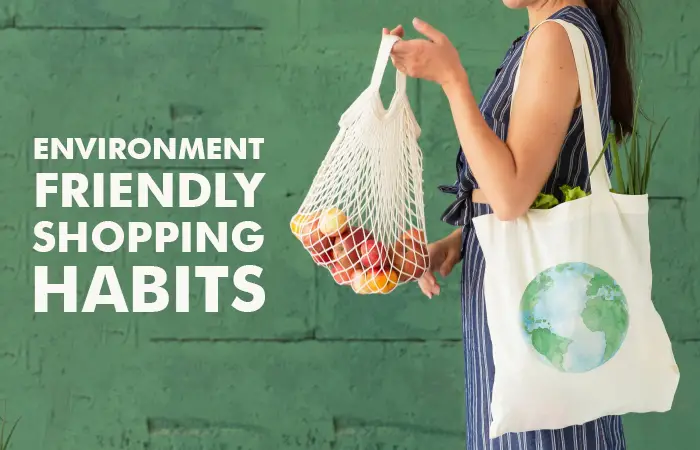Everyone wishes to lead a sustainable life by decreasing their carbon footprint with everyday activities. Did you know that there are many ways in which your shopping habits can benefit the environment? Today we are going to share some tips on adapting an eco-friendly lifestyle by making minor tweaks to your shopping sessions.
11 Environment-Friendly Shopping Habits
- Shop local – Buy the products from local merchants whenever possible. By doing this you can prevent the increase in the shipping of products for which companies waste natural resources and emit potentially damaging gases into the air. Shopping locally will mean less fuel usage in moving goods over long distances and less fuel to cool trucks and warehouses. As a result, the money flows to your local community and can enrich your neighbors rather than filling up the wallet of corporations in distant lands.
- Buy seasonal products – Spending money on buying out-of-season products or the ones that have been grown in other parts of the world will indirectly encourage the products to be shipped over long distances. Seasonal produce is the freshest option and you can fill up your pantry with some of the best products at reasonable rates from Farmers’ markets.
- Buy used products – You can buy or rent pre-loved items which are practically as good as new from sites like Craigslist. Some other sources of getting used products are donation centers and second-hand stores. Buying used items will help you save money and also cut down on the number of new products that are sold. You might even find some branded and luxury goods at a fraction of the original cost by shopping from the right thrift store.
- Get reusable shopping bags – Reusable shopping bags are an eco-friendly choice when you go to the store. This can also help you save money in the long run. Investing in heavy-duty shopping bags can make your shopping sessions more resourceful as you won’t have to use plastic or paper shopping bags over and over again.
- Support recycled packaging – Try to buy products in recycled packaging whenever possible. Doing otherwise will encourage wasteful packaging procedures followed by different manufacturers.
- Reuse storage containers – The next time you buy products in a big container, reuse the same for storage purposes. You can take the example of boxes which can also be used while moving. Reusing the containers rather than buying new ones will reduce the impact of extra packaging.
- Avoid pre-washed items – Pre-washed items like salad mixes or lettuce can serve as a convenient choice for many people. However, they might hurt the environment while also being hefty on the wallet. Rather than buying pre-washed items in plastic packaging, you should just opt for regular produce and wash it at your home.
- Don’t buy impulsively – Avoiding impulse buys can be a great way of shopping in an eco-friendly manner. Often people buy things they don’t need and these ultimately end up in a landfill somewhere. You can scan through your closet in search of things that you no longer use and sell them or exchange them for something you want. These products might also be donated to a thrift shop or local charity.
- Shop less frequently – One of the most effective eco-friendly shopping tips is to reduce your number of trips to the grocery store. Doing this can help you save fuel and do your part in helping mother nature. Often people drive to the store just for a bar of soap or a carton of milk. Buying in bulk every time you visit the market can help you save gas and also have some buffer on hand for emergencies. Making a list of your necessities before going shopping can help you buy things optimally. Never shop when hungry as you will naturally end up buying more food to mentally compensate for your hunger.
- Don’t splurge on online orders – Online marketplaces like Amazon have become the preferred choice of millennials courtesy of the immense convenience they offer. But limit your online orders to once a week by using the green shipping option during check out whereby the online shopping platform will consolidate all your orders into one box.
- Get cloth diapers – If you have kids, then cloth diapers are always a preferred choice over plastic ones as the latter are both expensive and take longer to biodegrade. They might end up in rivers and get carried to the ocean for polluting the waterways and oceans.
If you want to minimize waste, then you should try and reuse or recycle everything you can ranging from plastic take-out boxes to empty egg cartons. By following different lifestyle tips and consolidating your shopping, you can eliminate half of your packaging and fuel waste. An eco-friendly lifestyle will contribute to creating a sense of well-being and also be easier on your bank account.
ADVERTISEMENT

